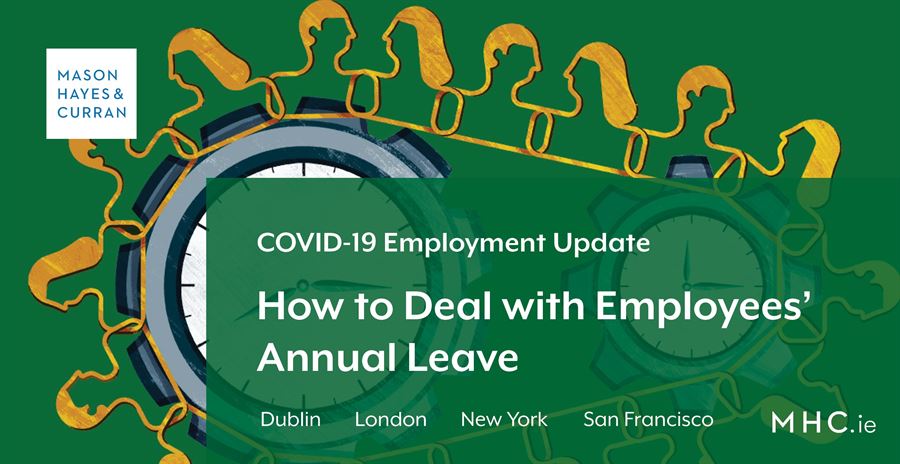
Can I ask my employees to take annual leave during the COVID-19 crisis?
The Organisation of Working Time Act, 1997 provides that the timing of an employee’s annual leave can be determined by the employer “having regard to work requirements”. We believe this gives employers the right to compel their employees to take annual leave during the emergency period.
In relying on this provision, employers are obliged to consult with the employees 30 days before the start of the annual leave. Few employers have the luxury of having the time to comply with the 30 days’ notice period due to these exceptional times. That said, employers should bear in mind the following considerations when deciding on annual leave:
-
The need for the employee to reconcile work and any family responsibilities, and
-
The opportunities for rest and recreation available to the employee.
In particular, employees should be left with a proportionate amount of annual leave for the remainder of the year to allow them avail of opportunities for rest and recreation once normal services resume. Therefore we would not encourage employers to request an employee to take all this years’ annual leave now, but to act reasonably and prudently – for example, a maximum of 10 days or so, or perhaps 75% of annual leave before the end of August where the holiday year ends in December.
What can I do about carry-over of annual leave?
Unlike the UK, Ireland has not implemented or proposed any legislation in relation to carry over of annual leave due to COVID-19, so the normal rules apply. Unless your contracts of employment specify the timing of taking carried over holidays, any holidays accrued in 2020 must be taken within six months of the end of that holiday year. For most employers, this will be the end of June 2021. Similarly, if employees have carried over annual leave from 2019, again, subject to your contracts of employment, those holidays should be taken within six months of the end of the 2019 holiday year (June 2020). Different rules apply if the employee has been on sick leave for part of the year.
Do employees accrue annual leave during lay-off?
Employees do not accrue annual leave during a period of temporary lay-off. However, they may still be entitled to their full annual leave entitlement if they manage to complete their full working hours during the leave year, i.e. when they return to work. For most employees, this will be difficult to achieve, and it is conditional on the employee remaining in their job before the leave year has elapsed.
If you are availing of the Temporary Wage Subsidy Scheme but your employees are not actually working, they will not accrue statutory annual leave for the duration of the scheme. The issue of contractual annual leave is slightly more complicated and will depend on the wording in your employment contracts.
What about public holidays?
Employees retain the right to be paid for a public holiday during a lay-off period of up to 13 weeks.
Comment
Employers have the right to ask employees to take annual leave during the lockdown period, as long as they bear in mind the employee’s family responsibilities and opportunities for rest and recreation later in the year.
For now, employers can continue to deal with carry-over of annual leave like they always have, subject of course to the employee’s contract of employment.
We recommend that employers should, where possible, be as flexible and reasonable as possible when it comes to annual leave requests. They may also consider offering employees alternative forms of leave during the crisis.
Given the evolving nature of the situation we find ourselves in, we recommend that employers take specific advice on managing employees during the emergency period.
For expert advice on annual leave entitlements for your employee during and after the COVID-19 crisis, contact a member of our Employment & Benefits team.
The content of this article is provided for information purposes only and does not constitute legal or other advice.





